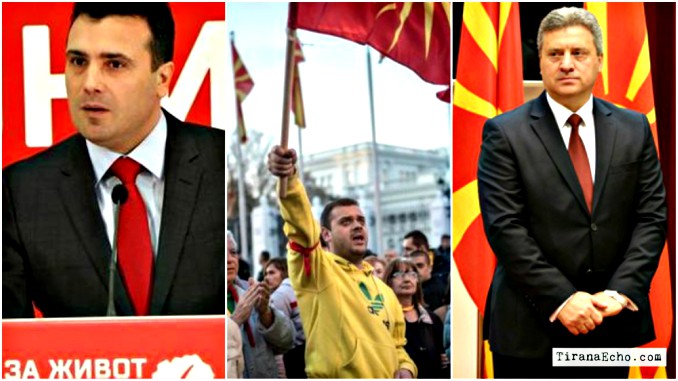
Months of political crisis has gripped Macedonia. The Balkan country has been without a government since last December when elections failed to give either of the two main parties a majority.
Since then, President George Ivanov has refused to approve a coalition between the leading Social Democrats, and Albanian parties, saying it would weaken national unity.
A recent attempt to include the country’s ethnic Albanian minority in a power-sharing agreement led to mass protests in the capital.
RT: The Macedonian Foreign Ministry has gone so far as to accuse neighboring Albania of meddling – what does it mean by that?
Martin McCauley: The Macedonian government is very concerned about the ethnic Albanian minority in Macedonia, which is about 25 percent. They have proposed that – it is called the ‘Tirana Platform’ – the Macedonian constitution is changed to allow Albanian to have the same status as Macedonian, which is a Slav language. The Macedonian government does not really like that. The Albanian Foreign Minister has said they should not be concerned about it, that this will promote interethnic relations in Macedonia; it will not lead to the federalization of Macedonia, and that the Albanians should, in fact, be accorded improved status. And Albania itself is not interfering in Macedonia, but they would like to see the ethnic Macedonians in Macedonia – they would like to promote their interests, they would like to support them…
RT: The EU has urged the president to allow the Albanian faction to participate in a coalition, but he’s standing firm. Could this affect the country’s bid to join the EU?
MM: Brussels has over the years been very involved in Macedonian politics. You go back to 2001, and they helped to negotiate the end of the military conflict between Albanians and Macedonians. Also, in 2015 the Przino agreement, which saw the early the resignation of the Prime Minister Nikola Gruevski [in January, 2016] and the coming into being of another government. Brussels over the last 10-15 years has been grooming Macedonia to become a member that has been involved very directly in economics and politics, economic and political development in Macedonia. But Brussels admits that democracy is fragile in Macedonia. What Brussels is afraid of is that if the tension between the ethnic Albanians and the Slav Macedonians are not resolved, it could result in military conflict again. This will be very bad and will set the country back because Brussels would like Macedonia gradually to meet all the criteria and become a member of the EU and also NATO.
RT: What does the political crisis in Macedonia mean for the broader context of Europe as a whole?
MM: The Balkans have always been a problem for the rest of Europe over the last 100 – 200 years, and this is another Balkan conflict in the making. Therefore, Brussels and Europe are very concerned, and they don’t want inter-ethnic fighting in Macedonia to begin because it could spread and involve Albania, it could involve other countries as well…
RT: How do you see this panning out? Will the president cave to pressure?
MM: The Macedonians can’t really give in because if they were to do that, they would lose face. Therefore, Brussels will be working diplomatically to find some solution, because the Slav Macedonians don’t want Albanian to be classified and become a second official language, because that could lead to parliament being divided into two languages, as well as with television and radio, etc.… Therefore they are keen that Albanian is regarded as one of the main ethnic languages, but not an official language. The Macedonian President and his government will attempt to maintain that situation. It remains to be seen whether the Albanian minority, which is 25 percent, will push very hard for a change in the constitution… The role of Brussels here is of key importance because it provides aid, military. It provides economic aid; it provides political support for Macedonia. Therefore the key decision-making here, in the end, will be in Brussels.
Source: RT